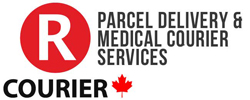
Regulations and laws governing conduct are the bones of the healthcare industry; they keep everything supported, structured, moving and functioning. Without them, trust in the medical community would fray, and people would not enjoy the same protections, liberties and efficient services they’ve come to expect.
These regulations extend to all arms of the healthcare industry – including logistics. It is essential for medical courier services like R Courier to comply with regulations, thereby safeguarding the transportation of sensitive materials, personal information and confidential records.
In this post, we outline the details of one such law – HIPAA – and its patchwork of Canadian equivalents. What is HIPAA? Why is it important? And how do medical couriers like R Courier approach compliance and privacy? Let’s take a closer look.
What Is HIPAA Compliance?
Short for the “Health Insurance Portability and Accountability Act,” HIPAA was a landmark 1996 ruling in US federal law that paved the structure of medical privacy as we understand it today.
Essentially, HIPAA covers various matters relating to confidentiality. It protects the industry from theft and fraud; it establishes clear guidelines for handling patient information; it prohibits practitioners and companies from disclosing protected information to third parties; and it develops standards for how individuals can “understand and control how their health information is used.”
HIPAA compliance simply refers to acting in accordance with the rules and regulations outlined in the act. Failure to comply generally results in stiff fines and penalties.
Why HIPAA Compliance Matters: The Importance of Professionalism
Compliance with HIPAA, and laws like it, is a fundamental protection.
We take it as a self-evident feature of modern life that we are entitled to certain privacies and protections, especially surrounding our health. We wouldn’t expect a doctor to disclose our diagnoses to, say, our friends or employers. Nor would we expect our medical records to be used in some aggregate form to help pharmaceutical companies market their products. And we’d certainly expect to be able to safely place an order for information to be transported. But it wasn’t always this way; before laws like HIPAA, the legal language around these protections and permissions was woefully hazy, sometimes non-existent.
In other words, HIPAA compliance upholds a fundamental human right – the right to privacy.
How R Courier Handles Compliance and Privacy
It’s important to note that HIPAA is an American law. While we pride ourselves on international courier services (and therefore know the ins and outs of HIPAA compliance), we also do a large chunk of our work here in Canada. In Canada, we have a patchwork of laws and regulations: PIPEDA (Canada), PIPA (BC and Alberta), PHIPA (Ontario), PHIPAA (New Brunswick), and many more privacy and health-related laws governing the handling of sensitive information.
Our medical couriers are well-versed in regulatory requirements governing the transportation of sensitive materials and information, possessing a deep understanding of the necessary permits, documentation, and protocols to ensure compliance with local, national, and international regulations.
We take laws like HIPAA and its Canadian equivalents very seriously, which is part of the reason why we’re a trusted name in healthcare courier services. And internally, we put as much stock in personal protections, as evidenced by our transparent privacy policy (which you can find at the link provided).
When choosing a medical courier, always inquire about their commitment to regulation compliance. At R Courier, you can trust us to comply.






